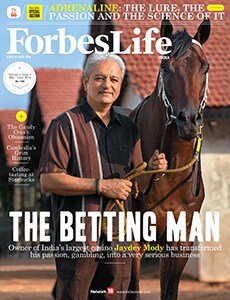


Fearlessness is an uncontested virtue today. And a pattern is emerging, perhaps symptomatic of the uncertainty and the craziness of the times we live in. Risk-taking is becoming all-pervasive: From the burgeoning startup economy to lifestyle choices, it is easier to take chances than it has been in recent memory. YOLO, right? It is also no longer necessary to resign oneself to ennui. Shaking things up, as the cool kids no longer call it, doesn’t need more than a leap of faith—literally (p72).
Adrenaline or, as Anjali Thomas describes it in her essay (p83), the “excitement elixir” has long been considered to have an almost magical effect, bestowing superhero moments on the consumer. Popular culture notwithstanding, science has poked holes in this larger-than-life illusion. However, the exhilaration, the rush, of pulling off the unthinkable is an addictive notion—one that is at the root of all gambling, risk-taking.
It is a heady theme to write to as well. Take the story of entrepreneur Jaydev Mody who has made a calculated foray into the Indian gambling industry with three casino ships in Goa. Refusing to get dragged into the moral quagmire that is created around this business, the 58-year-old Mody has unapologetically embraced his passion for gambling, reports Cuckoo Paul (p66).
His is a compelling tale as is the narrative that Salil Panchal and Pravin Palande find embedded in an industry based on chance. Meditation, action movies and martial arts offer protection against insanity in jobs that are—categorically—not for the faint-hearted, they are told (p78).
Happily, this is that time of the year where unwinding is almost mandatory. To that end, I am not sure how much this recommendation will help. However, if you are willing to brave it, do plan a visit to the killing fields of Cambodia. Even the vibrant urban vibe of the city around it cannot cloak the scars wrought by the monstrosity of genocide in the 1970s, found Kathakali Chanda (p24). For a less grim summer break, consider our curation of domestic destinations (p57).
The other route to spending your downtime requires considerably less travel. Candy Crush, many argue, is a monumental waste of time. As someone who spends around 15 minutes a day on it, I will agree to disagree. As will the millions who have transformed this simplistic game into a worldwide obsession, writes Sohini Mitter, who claims to be a non-believer. Her report, though, seems to indicate a conversion (p62).
The other ‘bad habit’ that has entered our pages is caffeine. Starbucks regulars will enjoy Samar Srivastava’s account of a coffee-tasting experience at its headquarters in Seattle (p90).
While on the subject of indulgence, I must admit that, at ForbesLife India, we fully support it. To showcase that, we have introduced a new section upfront, appropriately titled Toys (p10). Further explanation seems unnecessary. Happy reading!
First Published: May 23, 2014, 06:25
Subscribe Now(This story appears in the Jan 08, 2010 issue of Forbes India. To visit our Archives, Click here.)